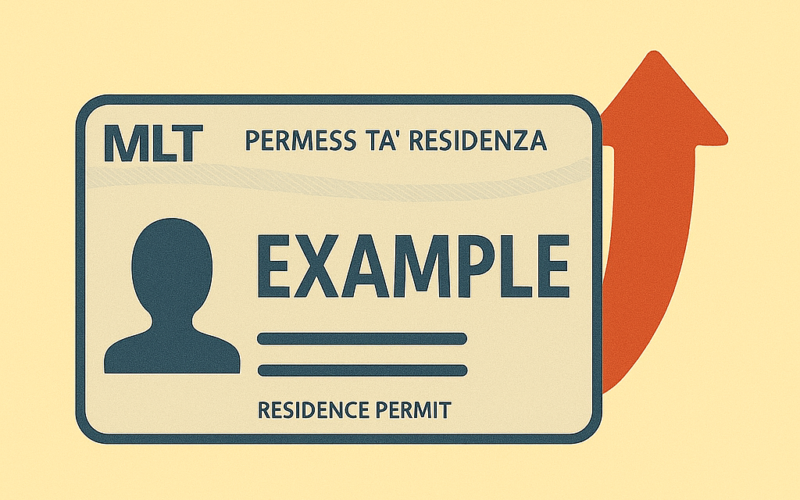As of 1 August 2025, Identità has introduced a new set of fees for single work permit applications, and for third-country nationals (TCNs), the change is impossible to miss. The once manageable application costs have seen a sharp increase, leaving many applicants and employers scrambling to reassess their budgets — and expectations.
Let’s break down what’s new, what’s changed, and what you should be prepared for.
New Fees for Single Permit Applications
The most significant change is the fee for a new single permit application, which now stands at €600. This applies to first-time applicants or anyone who is changing employer. Previously set at €300, the doubling of the cost has raised questions about affordability — particularly for lower-wage earners.
| Application Type | Fee |
|---|---|
| New single permit application | €600 |
| Change of employer | €600 |
| Change in job title/designation | €300 |
| Change in residential address upon renewal | €300 |
| Renewal with no changes | €150 |
The fee for renewing a permit with no changes has actually decreased from €300 to €150 per year. However, if the applicant makes any amendment — such as a new job title or residential address — the renewal is treated as a modified application, triggering a €300 fee. Even minor updates, such as changing an apartment or workplace, may fall under this category. In other words, if your file requires even minimal extra effort from officials, expect to pay double.
What About Family Members and Long-Term Residence?
Long-Term Residence (LTR) applications, previously costing €127.50, are now listed at €500 — nearly a 300% increase. This sudden hike caught a large number of applicants — especially those preparing to apply soon — completely unprepared, adding to the sense that the changes are much more expensive than expected.
Similarly, family reunification applications, which were once a nominal €27.50, have reportedly jumped to €50.
However, at the time of writing, this is not clearly detailed in the official Identità fact sheet and may be governed under separate legal provisions outside the single permit framework.
Additional Costs to Consider
In addition to Identità’s new permit fees, applicants should be prepared for a number of other compulsory expenses:
- Health Insurance: Valid for a minimum of one year, with coverage of at least €100,000 for hospitalisation. Expect to pay €180–€200.
- Lease Agreement Attestation: All new lease agreements must be supported by an attestation form, signed by a notary, lawyer, or legal procurator. Estimated cost: €50–€80, depending on the provider.
- Skills Pass (Tourism & Hospitality Sector) For those applying to work in Malta’s tourism or hospitality industry, a Skills Pass is mandatory. It includes a short training course and a final test administered by the Institute for Tourism Studies (ITS). Cost: €475 for new applicants. For those residing in Malta for more than one year, the fee is reduced to €375.
- Changing Skills Pass designation (e.g., from waiter to chef): The fee for changing the Skills Pass position is €150.
- Immunisation & Health Screening (for renewals or specific roles) Certain positions — especially in food handling or healthcare — require additional vaccinations (such as Hepatitis A and Typhoid). Vaccines must be purchased from a pharmacy at applicant cost. Screening forms (R1 or R2) must be completed and signed by a doctor.
- Private Doctor’s Certificate: Whether for health screening or basic medical clearance, you’ll need to visit a private GP. Fee: typically ranges from €15 to €25 per certificate.
These hidden costs for TCNs are not listed on the main Identità fee schedule but are just as necessary to get your application approved. First-time applicants often face the most paperwork — and the highest bills — while renewals might still require some of the above, depending on your job sector and any changes to your file.
Labour Migration Policy Summary (Follow-up to Our Previous Guide)
These new fees are part of a wider overhaul under Malta’s updated Labour Migration Policy, which took effect on the same date — 1 August 2025. You can read our full breakdown here, but the highlights include:
- More Compliance Monitoring : Termination rates are now being monitored by sector, and permit renewals may be denied if the original job conditions are not still being met.
- Job Vacancy Advertising: All jobs intended for TCNs must be advertised through Jobsplus for at least 3 weeks before application. For KEI, SEI, and EU Blue Card roles, the requirement is reduced to 2 weeks.
- Grace Period for Redundant Workers: TCNs who are terminated now have a 30-day window to find a new employer. If they can demonstrate sufficient self-support, they may extend this period by another 30 days, for a total of 60 days.
- Higher Salary Thresholds for Skilled Roles: KEI (Key Employee Initiative): now €45,000/year (up from €35,000) and SEI (Specialist Employee Initiative): now €30,000/year (up from €25,000)
- Restrictions on Switching Status: Individuals in Malta on short-stay or tourist visas can no longer apply for a work permit unless specifically allowed (e.g. athletes, medical cases).
- Form Submission Requirement — Employers must submit engagement and termination forms to Jobsplus within four working days of employment or contract termination.
- Company TCN Hiring Limits – Employers are capped on the number of TCNs they can hire, based on their workforce size:
- Micro: up to +200% of workforce
- Small: up to +100%
- Medium: up to +50%
- Large: up to +25%
Is This Fair?
The official explanation for the new fee structure is to streamline the process and allocate resources more efficiently. However, critics argue that the cost burden has been shifted squarely onto applicants, particularly TCNs who now face higher costs for routine changes.
Whether it’s a change of address, employer, or job title — nearly every action now carries a financial implication. From a policy perspective, this may reduce unnecessary amendments. But for applicants, the message is clear: even small changes come at a steep price.
Your Application Matters
At Expatax, we continue to monitor these changes closely to help individuals and businesses stay compliant, efficient, and informed.
If you’re unsure which category your application falls under — or how to prepare — contact our team for a personal consultation.







